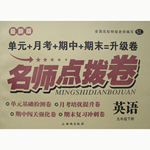题目内容
They boy said ________ couldn’t he work out the problem but his teacher didn’t know how to do it.
A. though B. never C. hardly D. not only
D
解析:
not only…but(also)句型中,not only提前句子倒装。

 名师点拨卷系列答案
名师点拨卷系列答案
| |||||||||||||||||||||||||||||||||||||||||||||
The other day at a supermarket, I saw a naughty boy of about six crying loudly, falling to the floor and refusing to move. All the while the troubled mother was trying to persuade him to behave well but failed.A little smack on his bottom would have done the job,I thought.
Teenagers also cause discipline(纪律)problems.As a teacher, I had a 16-year-old student who had fallen in love with a waiter at a fast-food restaurant.In fact,she had left home to stay with him.So we decided to put her in the school hostel.She refused.When she heard her mother begging her to stay in the hostel she turned round and said:“Why don't you stay in the hostel if you like it so much?”
My palms were itching to slap her for being so rude but the poor mother continued to cajole her,hoping that gentle persuasion would work wonders.It did not.The last I heard,she had run away from home again.
The list goes on and on.Could it be that today's parents are softer and believe that they must not rod(棍棒惩罚)their children for fear of the bad result? Or do they actually believe that the children will get rid of the bad habits and behave well naturally as they grow older? I beg to disagree.I believe it is the parents' duty to discipline the children even at a young age.
My children who are now adults will prove the fact that I used the rod when I thought it necessary.Later when they went abroad,they related to their British university friends on how they were disciplined.Their friends abroad were filled with horror and told my daughter that I could be charged with child abuse(虐待).However,my daughter showed great respect for me when she told them that she would not be where she was today if not for my strict discipline.
1.The underlined word“cajole”probably means .
|
A.persuade |
B.scold |
C.forgive |
D.punish |
2.The author would probably .
|
A.beat the children every day |
B.treat the children in a softer way |
|
C.leave the children as they are |
D.punish the children when necessary |
3.We can learn from the passage that .
|
A.the naughty boy’s mother hit him |
|
B.the teacher’s daughter is living with the teacher |
|
C.the author’s daughter was thankful for the author’s strict discipline |
|
D.the author was charged with child abuse by her daughter’s friends abroad |
4.Which of the following could be the best title for this passage?
|
A.Spoil Kids |
B.Value Discipline |
C.Respect Parent |
D.Protect Kids |